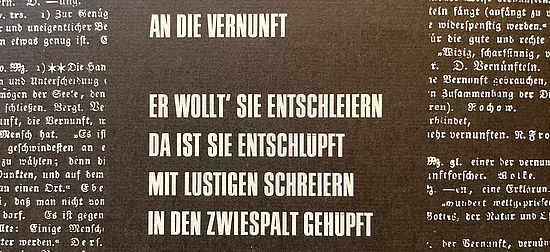
Partisans of the WordThe Fractured Ideas of Postmodernism
The subproject "Partisans of the Word. The Fractured Ideas of Postmodernism" traces a genealogy of postmodern thought in the German-speaking region, which, in its discomfort with modernity, reflects modernity's social forms of imagination.
Apart from theories, the subject of this project are fictions sprawling on the fringes of public discourse, published by alternative small publishing houses like Merve and Matthes & Seitz or in subcultural magazine projects like Tumult or Konkursbuch. In these theories and fictions, not only the societal household of norms becomes problematic, but also what is commonly understood as society. Postmodern thought on the publicist fringes can be understood as a laboratory for social imaginaries insofar as the unsayable and the sayable, future and past are combined.
It is striking that this peripheral storytelling is fractured. Pre-modern and pre-rational images and figures are found alongside hypermodern fictions of the future, with left and right narratives dissolving into one another, too. Notions of revolt, partisan or demise function as ambivalent, moving terms, mediating between semantic divides.
Likewise, it is no longer possible to strictly separate what is still theory and what is fiction already. Theories make use of figurative representations, images, and fictional narrative forms, through which they become tangible and can be processed affectively. Conversely, theory penetrates literature: Characters of novels become diagnostic social figures of the times, they do not only read Ernst Jünger, but struggle along chiliastic apocalyptic scenarios suspended by promises of salvation.
Within this disorder of the semiotic material and its narrative forms of representation, the ordering structures of society are irritated—and thus become workable.
In short, the subproject is a different history of ideas of the late BRD. It aims to illuminate the narratives of the dark sides of reason and trace back their imaginary forms of processing.
Thus, it becomes a history of the forms of imagination, which aims to illustrate the role of fictions for the processing of crises of societal order.
It is a history of small forms, in which the essential is negotiated in paratexts, in sketches, aphorisms, discussion protocols or diary entries.
It is a history of the transfer of French theory and German thought, of factual and fictional narrative forms or of the transmission and reconfiguration of symbolic-political semiotic material.
Thereby, the subproject finally becomes a sociology of literature of intellectual thought and its stories of departure from and reversal of political affiliations.
Further Information & Contact
University of Basel
Carolin Amlinger
Department of German Studies
Nadelberg 4
4051 Basel
